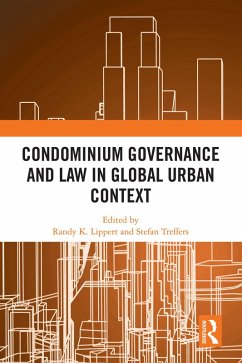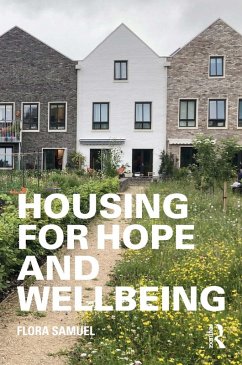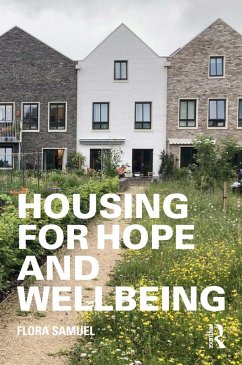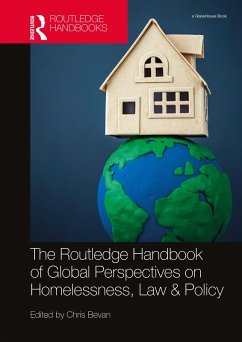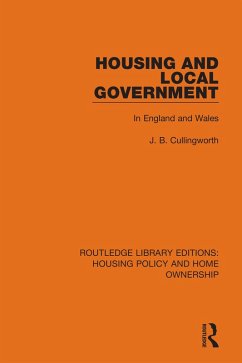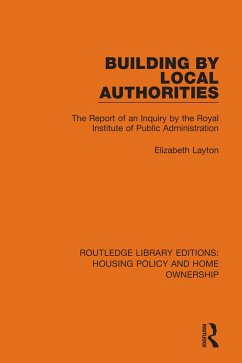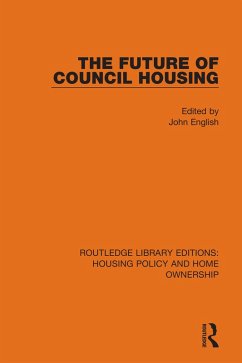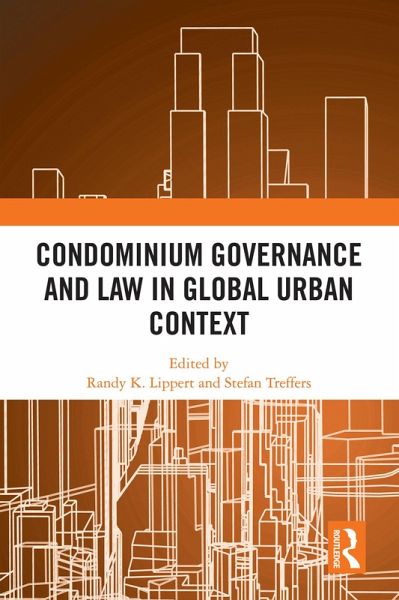
Condominium Governance and Law in Global Urban Context (eBook, ePUB)
Versandkostenfrei!
Sofort per Download lieferbar
41,95 €
inkl. MwSt.
Weitere Ausgaben:

PAYBACK Punkte
21 °P sammeln!
This book examines condominium, property, governance, and law in international and conceptual perspective and reveals this urban realm as complex and mutating.Condominiums are proliferating the world over and transforming the socio-spatial organization of cities and residential life. The collection assembles arguably the most prominent scholars in the world currently working in this broad area and situated in multiple disciplines, including legal and socio-legal studies, political science, public administration, and sociology. Their analyses span condominium governance and law on five continen...
This book examines condominium, property, governance, and law in international and conceptual perspective and reveals this urban realm as complex and mutating.
Condominiums are proliferating the world over and transforming the socio-spatial organization of cities and residential life. The collection assembles arguably the most prominent scholars in the world currently working in this broad area and situated in multiple disciplines, including legal and socio-legal studies, political science, public administration, and sociology. Their analyses span condominium governance and law on five continents and in nine countries: the United States (US), China, Australia, the United Kingdom (UK), Canada, South Africa, Israel, Denmark, and Spain. Neglected issues and emerging trends related to condominium governance and law in cities from Tel Aviv to Chicago to Melbourne are discerned and analysed. The book pursues fresh empirical inquiries and cogent conceptual engagements regarding how condominiums are governed through law and other means. It includes accounts of a wide range of governance difficulties including chronic anti-social owner behaviour, short-term rentals, and even the COVID-19 pandemic, and how they are being dealt with. By uncovering crucial cross-national commonalities, the book reveals the global urban context of condominium governance and law as empirically rich and conceptually fruitful.
The book will appeal to researchers and students in socio-legal studies, law, sociology, political science, urban studies, and public administration as well as journalists, social activists, policymakers, and condo owners/board members.
Condominiums are proliferating the world over and transforming the socio-spatial organization of cities and residential life. The collection assembles arguably the most prominent scholars in the world currently working in this broad area and situated in multiple disciplines, including legal and socio-legal studies, political science, public administration, and sociology. Their analyses span condominium governance and law on five continents and in nine countries: the United States (US), China, Australia, the United Kingdom (UK), Canada, South Africa, Israel, Denmark, and Spain. Neglected issues and emerging trends related to condominium governance and law in cities from Tel Aviv to Chicago to Melbourne are discerned and analysed. The book pursues fresh empirical inquiries and cogent conceptual engagements regarding how condominiums are governed through law and other means. It includes accounts of a wide range of governance difficulties including chronic anti-social owner behaviour, short-term rentals, and even the COVID-19 pandemic, and how they are being dealt with. By uncovering crucial cross-national commonalities, the book reveals the global urban context of condominium governance and law as empirically rich and conceptually fruitful.
The book will appeal to researchers and students in socio-legal studies, law, sociology, political science, urban studies, and public administration as well as journalists, social activists, policymakers, and condo owners/board members.
Dieser Download kann aus rechtlichen Gründen nur mit Rechnungsadresse in A, B, BG, CY, CZ, D, DK, EW, E, FIN, F, GR, HR, H, IRL, I, LT, L, LR, M, NL, PL, P, R, S, SLO, SK ausgeliefert werden.




